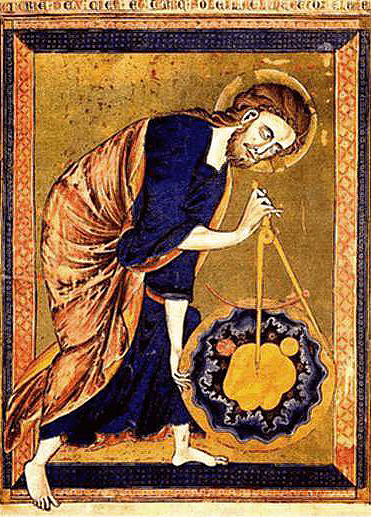 Since the name of this thread is in latin, and much of the terms I am going to use are in latin, let me put this forth in the same tongue.
Since the name of this thread is in latin, and much of the terms I am going to use are in latin, let me put this forth in the same tongue.Credo in Deum, omniscientum omnipotentem et omnipraesentum, factorem visibilium omnium et invisibilium, caritas plenum.
"I believe in God, all-knowing all-powerful and everywhere at once, the creator of all which is seen and unseen, full of love."
Examine and ponder this for a moment.
Being able to see to the end of time and tracing back the threads, this Pancreator would know what decisions were made in any circumstance, the reasonings behind them and the outcomes (both possible and actual). Herein unwinds the Gordian Knot of free-will vs. predestination. At the fork in the road, you choose left, the Divine knows what will happen. If you choose right instead, that action's consequences are also known. Indeed, the outcome of any possible choice is known. That does not obviate a man's free will, but rather recognizes the omniscience of the Divine.
Another part of this is that the Pancreator is all powerful. This sort of limitless ability means that the Divine can be male, female, other, both, none or all...and may very well be. What does this mean? In short, that the Divine is no less (or more) a god than a goddess and that concepts like the sex and appearance of the Pancreator are methods by which we may be able to help ourselves comprehend the Divine, but are not descriptions of the Divine itself. In a different way, we may be able to discern some things about a potter from the clay pitcher, but we should never confuse the pitcher for the potter.
The next bit is trickier, for the implications are far-ranging. The Divine is everywhere at once. That means that it is in you, me, the tree atop Rushmore, the rocks at the bottom of Challenger Deep and the dog on Alpha Centauri....all at once. That means that the Divine is within you, right now. This will be discussed in depth in the next Credo post.
That this Divine Entity created everything I take as an article of faith. I will state that I have no specific explicit evidence for this, but I'm not really wanting to argue this point at the moment. That the Pancreator is the Pancreator is good enough for the nonce. (read, I may revisit this more in full later).
That the Divine is full of love is our last point and it is at this time I should bring back the latin. I specifically chose caritas over a number of other words to describe the love of the Divine. Caritas, and it's greek cognate agape, refer to a specific type of love. It is unconditional and abounding in both love (as we normally consider it) and kindness.
It is this love which is the very definition of the Divine "qui non diligit non novit Deum quoniam Deus caritas est/ Who does not love does not know God, for God is love"(1 John 4). It is also the basis for the English word and the Christian virtue of Charity, the greatest of the seven heavenly Virtues.
Credo.
No comments:
Post a Comment